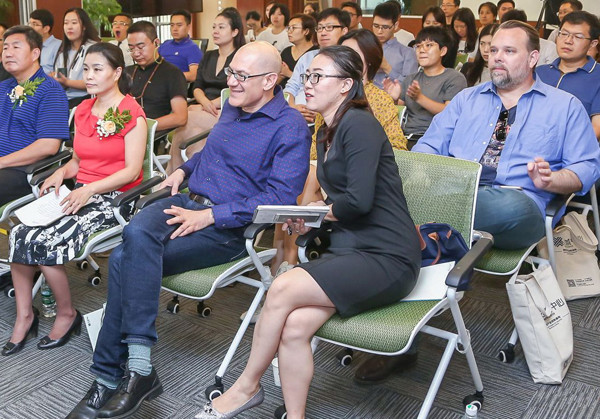 |
|
Startup enthusiasts take part in an incubator-related event organized by BCTID and Founder Space in Changping District, northwest of Beijing. [Photo provided to China Daily] |
Earlier this year, BCTID set up a wholly owned subsidiary in the United States, and signed a cooperation agreement with the Silicon Valley Innovation & Entrepreneurship Forum, an international conference that promotes business partnerships between the US and the Asia-Pacific region.
"We hope to build more joint office platforms and laboratories in the future," said Wang, "And we'll gradually expand the international innovation platform business to the United Kingdom, Israel and Japan."
In the same year, it announced the establishment of the "Champion International Innovative Development Platform".
The company actively cooperated with overseas universities for sharing resources like their laboratories. For instance, it brought together advanced medical technology and talents from Stanford University and UC Berkeley.
Among its achievements are telemedicine projects, image recognition application projects and virtual reality-related projects.
In September 2017, BCTID helped set up Founders Space, a startup incubator and accelerator, which resulted in high-quality ventures overseas and cutting-edge technology.
It has also helped incubate companies, encouraging them to acquire overseas resources like the latest information on Silicon Valley innovation.
To encourage Chinese high-tech enterprises to go global, BCTID teamed up with the Beijing Institute of Big Data Research to establish a research and development lab in the field of AI.
Through this lab, small and micro businesses in China can directly access San Francisco without having to worry about concerns like cultural adaptation.
BCTID also offers services relating to intellectual property rights of exclusive or custom-built software. Toward this end, it has formed a strategic partnership with the Small Business Administration. The SBA and BCTID ensure that Chinese companies' overseas projects have the right follow-up when the latter apply for registration in the US.
BCTID is harnessing big data technology to publish information about overseas talent and institutions on its proposed online platform. The data resource is expected to help enterprises have real-time communication and solve problems relating to information mismatch, thereby increasing their chances of going global.
"Our overall goal is to provide enterprises with advanced technology, matching markets and high-end talents," said Wang.
By the end of 2017, BCTID's assets in the form of various resources were worth 7.9 billion yuan ($1.25 billion). In just a little over two years, it acquired, developed and operated a total of 640,000 square meters, forming a specialized industrial service chain that inspired a batch of innovative enterprises to settle in.
Among these enterprises, some are quite mature in overseas business. In the past two years, dozens of them have participated in world-class exhibitions, which undoubtedly accelerated their pace of going global.
A recent report in CB Insights, published by the Venture Capital Research Institute, indicated that Chinese startups received nearly half of the global investment in AI last year, surpassing those of the US for the first time.
Niu Yilin contributed to this story.